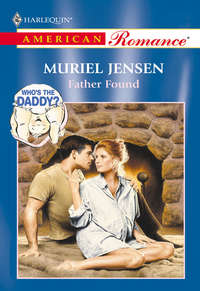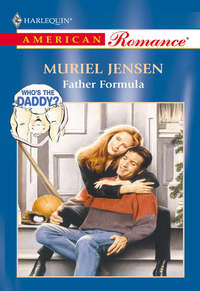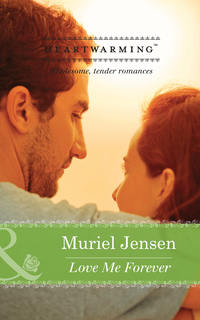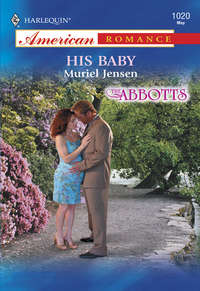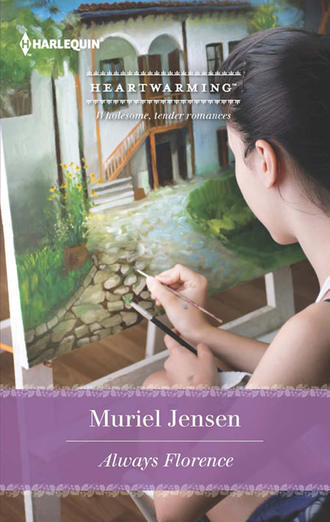
Полная версия
Always Florence
Sandy gave her shoulders a squeeze. “You are so clever. And that’s what I came to talk to you about.”
Bobbie opened the white bag. Sandy had brought a berry scone from the Astoria Coffee House downtown, one of Bobbie’s favorite indulgences.
She looked up at her friend suspiciously. “Thank you, but what do you want from me that requires a bribe?” The girls came closer at the possibility of treats. “Can I give them a bite?”
“Just a little one.”
Bobbie broke off two chunks and offered them to the girls, who accepted greedily. Then she tore one off for herself.
“Astor School needs someone to help with a couple of art classes for the lower grades. The budget for that kind of thing is gone this year. Would you do it?” Sandy waited expectantly.
“How do you know they need someone? Your kids aren’t even in school yet.”
“My boss is on the school board, and our office is donating supplies if we can find a teacher.”
“But I’m here only until January.”
“Holidays are when the kids get restless, and art gives them something fun to focus on. What do you think?”
“Sure. I guess.” She wanted to help, but wasn’t certain she was qualified. “I don’t know a lot about teaching children. I suppose I can find projects on the internet.”
Sandy opened the big tote she carried as a purse. A sock monkey wearing a tutu and ballet shoes tumbled out as she withdrew a large paperback. She held it up. The title was Holiday Art Projects for Elementary Grades. She handed it to Bobbie, while Zoey rushed to rescue her ballerina monkey.
“Thank you.” Bobbie flipped through the book. The projects were simple and she’d seen them before, but that was probably good for children. Maybe she could handle this.
“So, you’ll do it?”
“What’s the schedule?”
“Once a week, Friday mornings, ten to eleven-thirty—until the kids get out for Christmas break.”
“I’m still working on the pieces for your office, remember.”
A wave of Sandy’s hand dismissed that as a problem. “I know you to be brilliant. You’ll get it all done. And what’s an hour and a half a week?”
Bobbie hadn’t intended to get this involved in her temporary residence, but she remembered how exciting her art periods had been in grade school. She liked the thought of providing that sense of fun and discovery to kids. And her father would love knowing she was spending time away from her studio.
“Okay, I’ll do it. Should I call the teacher?”
“I put her name, number and email on the bookmark.” Sandy indicated where it protruded from the book. “She’ll be thrilled. Great! Okay, girls.” Bobbie’s friend shepherded her daughters toward the door. “Can we come by and trick-or-treat?”
She got up to walk them out. “I’d be disappointed if you didn’t. In fact, I made you something to put on your front porch.”
The three followed her into the kitchen, where she retrieved a medium-size pumpkin sporting a cat face. She’d cut off the top and cleaned out the seeds, then carved part of the eyes and nose. With a special tool, she’d removed only the orange skin and thinned out the pumpkin flesh in a few places, defining the cat’s features so that a candle would shine through. The cat had a whimsical expression, wide eyes, whiskers, and a tongue protruding from his scalloped mouth. She’d placed a flameless candle inside and turned it on to demonstrate.
The girls giggled and squealed. Bobbie felt as fulfilled as if she’d sold a 24” x 36” oil on canvas.
She pointed to two smaller pumpkins she’d made with less interesting faces, but that she’d drilled to hold a wire loop. She held one up in each hand. “Or do you like these better? You can hang them in the tree in the front yard.”
The girls both voted on the cat pumpkin.
“Okay. I’ll carry it out to the car for you.”
Sandy strapped the girls into their car seats, but there was great protest when she tried to put the pumpkin in the trunk.
“If I set it on the seat between you,” Sandy explained, “it might fall over when we go down the hill.”
Logic didn’t sway them. Bobbie ran into the open garage, found a box the right size and placed the pumpkin in it, then set the box between the girls. Each rested a hand on the pumpkin, delighted.
“There!” Bobbie exclaimed, hugging Sandy. “Peace reestablished.”
“You’re really very good at this, Bobbie. You sure you want to devote your life to art rather than children?”
There was no question. “I’m sure. Now, get out of here so I can get back to work.”
“Incidentally...” Sandy opened the driver’s door, then stopped. “What do you hear from Laura?”
Laura Kirby had been having chemotherapy at the same time that Bobbie had her first infusion. Sandy managed time away from work and her mother was able to babysit so that she could provide moral support. Bobbie and Laura had become fast friends, bonding over their mutual need to accomplish pressing goals. Laura’s was to have a baby—something she and her husband, a law student, had put off until his graduation. Fortunately for Laura, she’d been given none of the drugs that played havoc with a woman’s fertility.
Laura and Bobbie had lunch occasionally, and since Bobbie had moved to Astoria, kept in touch through email. Sandy had seen Laura just that one time, but had liked her and was happy that she and Bobbie had forged such a strong friendship.
“Is she pregnant yet?”
“Latest report, not yet,” Bobbie replied. “But they’re having fun trying.”
“Great! Next time you email, tell her I said hi.”
“I will.
Bobbie waved off Sandy and her girls and went back inside. Monet wandered out from behind the sofa—his usual hiding place when children visited—and followed her into the kitchen to a favorite spot on a sunny windowsill.
Before going back to work, Bobbie went out to the garage to get the hat and jacket she’d left there. They’d been soaked with tea and should be thrown into the laundry.
She stopped in surprise at the sight of three pristine shelves leaning up against the inside wall. She slipped one onto a surviving bracket and found it a perfect fit.
Feeling guilty that the boys had probably gotten into trouble for the morning’s escapade, she picked up the two small pumpkins Addie and Zoey had rejected in favor of the cat-faced one, and headed next door.
The Raleighs had left earlier, but she’d noticed the car was back. She walked around to the front. The tall mountain ash on the deep lawn was covered in red berries. Birds chirped and fluttered, so that the tree seemed alive. Bobbie stopped to take in the pleasure of the moment. There was such richness in nature for her now. She’d always been aware of it, but since she’d been ill, she felt more a part of it—as though everything in the universe was connected, herself included.
She stepped over a toy truck and climbed the steps to the wide front porch of the yellow house. A seasonal figure made of straw and wearing overalls and a baseball hat sat on a wooden bench. Two pumpkins, obviously carved by children, sat beside him.
She knocked on the front door with its classic Craftsman leaded window, and heard Arnold’s deep bark, followed by the sound of running feet.
The door was yanked open and she was greeted by...well, she wasn’t sure who. She’d apparently walked into a comic book.
“Hi, Spidey!” she said, recognizing the blue-and-red costume worn by the smaller boy. But she wasn’t sure which character the red-gold-and-black costume represented. “Who’s your friend?”
“I’m Iron Man,” Dylan replied, striking a pose.
“Ah. I’m sorry I didn’t recognize you.”
Arnold, standing between the boys, wagged his tail and reached up to lick her hand when she patted his giant head.
Dylan did a turn. “Iron Man is really Tony Stark. He made armor to escape terrorists in Afghanistan.”
“Iron Man can fly,” Sheamus said, “but I can shoot spiderwebs.”
“Iron Man can fly without having to hold on to spiderwebs or anything else.”
Sheamus shrugged off the implied criticism of his powers and pointed to the pumpkins in Bobbie’s hands. “What are those?”
“Miss Molloy.” Nate appeared behind his nephews and opened the door wider. He now wore a dark blue sweater and had shaved. She couldn’t help staring a little. He looked fresh and crisp, but he still wasn’t smiling. The “what are you doing here?” look in his eyes seemed to mirror his polite but cool greeting.
Still, he was handsome. She felt the smallest flutter behind her breastbone. Of course, she’d had radiation there, and a burn remained as a result. There was a little bit of a laserlike quality to his expression.
“The shelves fit okay?” he asked.
“They’re perfect. Thank you.” She remained on the porch, but held out the pumpkins. “I have only a minute. I made a few pumpkins for myself and a friend’s children, and had these left over. I thought the boys might like them. But I see they already have some really cool ones on the front porch.”
The boys pulled off their headpieces and each reached excitedly for one of her pumpkins before she could withdraw them.
“Whoa!” Sheamus held his up, then turned to study Dylan’s. “I like mine better. It has a smiley face.”
Dylan’s had a saw-toothed mouth to indicate distress or fear. He seemed to like that. “Who wants to smile on Halloween? It’s supposed to be scary. This one’s the best!”
“You can hang them on the plant hooks on the porch,” Bobbie said, “or in the tree in the yard.” She reached into Dylan’s to show Nate the flameless candle. “No fire, so you don’t have to worry about where they put them.”
“Good idea.” Nate duly admired each one. “We do have our share of disasters around here. I’m happy not to have to deal with fire. Thank you. That was very thoughtful.” He said it in the same tone one might use to say, “And don’t let the door hit you on your way out!”
She ignored him and smiled at the boys. “I have to get back to my work. Be sure to come by trick-or-treating. I’m making something special.”
Sheamus jumped up and down. “We’ll come to your house first!”
“Thanks, Bobbie.” Dylan’s smile was wide. “I’m going to put my pumpkin in my room.”
“Me, too!” Sheamus ran off toward the stairs. Dylan followed more slowly, holding his up to study it as he walked, Arnold at his heels.
“You made them very happy.” Nate stepped out onto the porch, the statement sounding a little like an accusation. She frowned up at him, wondering what his problem was. “Thank you,” he added grudgingly. “I sometimes have trouble doing that.”
Ah. She’d overstepped somehow. But she’d be darned if she’d apologize for having pleased his nephews.
“Gotta go,” she said with a pretense of a smile. “Thank you for the shelves.”
She was halfway down the stairs when he ordered, “Wait!”
She stopped in her tracks, holding on to the railing to get her balance. She turned to ask what he wanted, and found him right beside her. He caught her arm. “Sheamus left one of his trucks at the bottom of the steps.” He tightened his grip and led her around it. “I’ve told him a million times about leaving his toys out, but he never remembers.”
Nate’s eyes were turbulent suddenly, that remote, unsettling quality gone. It made it somehow easier to talk to him.
“How did you become a parenting uncle?” she asked. She thought the answer to the question might help her understand him. Not that she had to make a connection here. By all indications, he didn’t want one, either. “On second thought,” she said quickly, turning to start across the lawn, “it’s none of my business. I apologize for invading your space.”
“No.” Again he stopped her with a single word. “You did no such thing. And there’s nothing secret about it. Their father was my brother. He and my sister-in-law died in a boating accident six months ago.”
“Oh.” The small sound expressed her horror at that information. She felt sudden sympathy for him. “I’m so sorry. How awful for all of you.”
He made a one-handed gesture of helplessness. “It is what it is—at least that’s what everyone says about things they can’t explain or do anything about.” He stopped on the lawn, his expression grim. “I guess the suggestion is that since you can’t change it, you have to accept it. I’m having a little trouble with that.”
She nodded in understanding, his admission forcing her to reassess her opinion of him. “I get that. I tore my curtains off my bedroom window when my mother died. I was in my teens. Then I had to replace a window in my kitchen door after my teacup went through it when I got my cancer diagnosis.” She smiled in self-deprecation. “Sometimes it’s just too hard to pretend that we’re adult and in control.”
He frowned as his eyes went to her hair. “I wondered if that was the case. Not that it’s any of my business.”
“It’s all right. Nothing secret with me, either. Millions of people deal with cancer every day, and my prognosis is better than many.” She ran a hand self-consciously over her head. “And my hair’s back. Well, mostly. So, all in all, things aren’t too bad.”
His eyes roved her hair, then slowly and with an interest that pinned her in place, moved over her face, feature by feature. He lingered for the barest moment on her mouth, then went back to her eyes.
“So, the cancer is gone?” he asked.
“Ah...” She had to pull her thoughts away from his close scrutiny. She swore she could feel fingertips everywhere his gaze had touched. “No. But I can live with it for a long time. It doesn’t go away, but it’s not as aggressive as other types.”
“You seem to have adjusted,” he said. “Or maybe the better word is accepted. How did you reach that point?”
She didn’t have to think. It was the decision to move to Florence that had finally put her on her feet. “You’re right. It is what it is. Nothing says it quite so well. I couldn’t change it, and I was tired of pouting and being scared, so I started to make plans.”
She began to walk across the yard. She was surprised when he kept pace with her.
“What kind of plans?”
“I’m moving to Italy after the holidays to pursue an art career.”
“I thought you had an art career.”
“What I do now is commercial. I want to go where the masters worked, to study their genius and try to learn and absorb. I want to see if there’s fine art in me. You know, art that changes the world.”
“That’s a big dream.”
“Well, when you flirt with death, you tend to think big. I mean—I think I have time, but I don’t have forever. So, if I’m going to get to it, it’s now or never.”
He took her hand as they reached the row of chrysanthemums that bordered his side of their adjoining driveways. She talked to cover a little nervousness. His grip was strong, the skin on his hands smooth. “And I feel really good. My father is a doctor and moved in with me during my treatments. He cooked all the right things for me, and when I came here, made up a diet that I try to follow. If he hears I’m eating badly he’ll come and take over my kitchen again.”
“Ah. The hovering parent.” Nate freed her hand and they walked side by side around his car, then her truck. “I know something about that. My mother died of cancer when Ben and I were in high school, but my friend’s mother is my housekeeper and she’s a dragon where the boys’ and my health are concerned. When she thought I wasn’t getting enough sleep, she bought me bed pillows made of Hungarian goose down mingled with herbs that are supposed to help with stress relief.”
“I’m sorry about your mother,” Bobbie said gravely. Then she smiled. “Buying you goose down pillows is just caring and concern. My father cooked every meal for me with fresh organic produce and grains, and hid all my chocolate.”
Nate questioned her with a look. “Isn’t that just love and concern?”
“I guess it is,” she conceded, stopping to study her dormant rhododendron. “He taught me to fend for myself, and now wishes he hadn’t. And separating me from my chocolate is a suicidal move.” She plucked at a dead flower in the middle of the bush.
“Stella—that’s my housekeeper—says it’s as important to accept help as it is to give it. Maybe you should give your dad a break. He sounds like a great father. And I’m just learning how hard it is to be a good parent.”
“He’s wonderful. But healing the body is simpler than healing the soul and the emotions.” She frowned sympathetically. “And you’re in pain, too. If you don’t feel like the perfect stand-in father, I think you should give yourself a break.”
She reached farther in for another dead flower. “My dad’s coming for Thanksgiving. He called me today to make sure I was getting out and meeting people and not spending every waking moment in my studio. I guess you have to be an artist to understand another artist.”
“Have you met people?”
“I’ve been here just a month. And I’m working on the commission, so there hasn’t been a lot of free time. But the friend who got me the commission just talked me into teaching art classes at the school once a week.” She laughed softly. “At least I’ll be able to tell Dad I know a lot of children.”
“Astor School?” he asked. When she nodded, he said, “The boys go to Astor. What grades?”
“It sounds like they’ll be combining a few of the lower grades for my class.”
“Sheamus is in second grade. Dylan, though, is a fifth grader, so he probably won’t have access to the class. And he’s the one who shows definite artistic abilities. He’s really smart all around. He’s crazy about the MythBusters. Do you ever watch that?”
“No. Not much time for TV. Except Dancing with the Stars.”
Her neighbor closed his eyes. “Saints preserve me. Anyway, when I was just his uncle, we used to watch it together, and I used to think his love of exploring and experimenting was fun. The two hosts take accepted myths and action scenes from movies to see whether they could really happen. Even the president and his daughters watch it, and asked the show to prove an old myth about Archimedes’s death ray.”
“Archimedes...” Bobbie repeated the name, trying desperately to remember who he was.
“Among other things, he was a physicist and an astronomer. He’s supposed to have set fire to an invading Roman fleet by positioning his army to direct mirrors that reflected the rays of the sun. The hosts of the show used five hundred students with mirrors, but it didn’t work. Anyway—now that it’s my job to keep Dylan from killing himself, I don’t enjoy the show as much anymore.”
“You mentioned the power saw this morning. What was he doing when that happened?”
“Trying to build a bike ramp. We got off lucky. I hate to think what he could have done to himself with the saw or the ramp if he’d finished it. I locked up my power tools and asked Stella to be extra vigilant. Meanwhile, I’ve got to get him busy with something.”
“I have a thought.” Suddenly inspired with a positive solution for Dylan, Bobbie withdrew her hand from the bush and started off toward the house.
At the sight of a large spider on the back of her hand, she stopped in her tracks and shook her arm frantically. The spider held on. She screamed.
Nate caught her wrist in one hand and swatted the spider away with the other. “You confront a major disease with heroic resolve and freak out over a spider?” He almost smiled, but not quite. “It is Halloween, after all. They’re supposed to be here.”
She did a sort of all-body shudder and brushed both arms. “Okay,” she allowed. “But not on me.”
“I guess Nature doesn’t know that.” The remark was teasing, but he still didn’t smile. “You said you had a thought,” he prompted.
“Right.” She gave up trying to figure him out and ran lightly up the back porch steps. “If Dylan’s interested in art, I can give you a sketchbook and some pencils.”
Nate hesitated, then nodded. “Sure. If you can spare them.”
“Come with me.” She pushed open the back door. “I’ve got pastels I never use, too. But that can get messy.”
He followed her inside. “I don’t care about the mess, if he’ll be occupied with something that carries low injury potential.”
“Great. Wait here for a minute. I’ll find some things for him.”
* * *
NATE WALKED INTO her small living room while she disappeared into the back of the house. He was curiously uncomfortable in her presence, though he wasn’t sure why. Possibly because there was such brightness about her and it seemed intrusive in his dark, angry world. But if she had something that would interest Dylan, Nate would be happy to have it.
The walls in her living room were a go-with-everything off-white that would have seemed dull but for the berry-colored sofa and chair, the coffee table painted with stylized flowers and vines trailing down the legs, and all the unrelated but individually striking paintings on the walls. There was a seascape, a still life, a wild pattern of some sort, a languorous nude in the grass and a large canvas covered with what looked like a conveyor belt with rabbits on wheels careening off it. A bright sun shone, smiling birds flew around the rabbits and in the background ducks on a pond bathed happily. He stepped forward for a closer look.
The painting defied explanation. He’d always thought he preferred representational art—a pot of flowers, a portrait, a familiar scene—but this brought a smile and seemed to inspire in him a sense of good cheer. It was ridiculous, but somehow enjoyable. The signature on the bottom right read “RLM.”
He heard light laughter behind him. “That’s called Hare Raising.” It was Bobbie’s voice.
He continued to study the canvas. “Really. It’s wild. I’m surprised that I like it, but I do. Who’s RLM?”
“I am.”
He turned to her in surprise. She had an armload of books, papers and boxes, and a canvas tote she was trying to put it all in. He took the bag from her and held it open. “So, Bobbie is for, what? Roberta rather than Barbara?”
“Right.” She dropped everything inside, then took the bag from him and gave it an adjusting shake. She handed it back. “Roberta Louise Molloy. That was my one foray into surrealism.”
“I think of myself as a traditionalist, but I really like it.”
“I did, too, when I did it. It was toward the end of my first round of chemo and I had to dig deep for energy and enthusiasm, so I tried something new. I had a dream one night about a similar scene. I added the birds and the ducks just because I like them. But I haven’t been able to find that feeling again.”
He looked at the painting once more, then at her. “The feeling of a frightened rabbit on a wild ride?”
She blinked and stared. He was obviously on target, but he felt sure she didn’t appreciate it. Something shifted in her eyes as she lowered them and closed him out. He could almost hear the sound of a slamming door.
She gave him an artificial smile. “Yes. That was perceptive. I think you probably understand the boys better than you think you do.” She walked ahead of him to the door and opened it for him.
He paused in the entry before she physically pushed him out. Instinct told him that was coming next. “Thank you.” He held up the bag. “Dylan will be very happy.”
“You’re welcome. See you on Halloween.”
He stepped onto the porch as the door began to close.
It was clear that, for whatever reason, she didn’t like being understood. Which was probably best. He didn’t want her to become a chummy neighbor and understand that he was a deeply angry man who wasn’t dealing very well with his life, and had no idea how to raise two lost and frightened little boys.
God, he missed Ben.
CHAPTER THREE
“COOL!” Dylan studied the art supplies spread out on the kitchen table. He picked up a sketch pad and flipped through the blank pages. “Really?” he asked Nate for the third time. “Bobbie gave you all this for me?”
“Yeah.” Nate turned off the burner under the whistling teakettle. “She was telling me she’s teaching art at your school until the holidays, but just for the lower grades. I told her that was too bad, because you like to sketch. She thought you might like to have some stuff to work with.”




